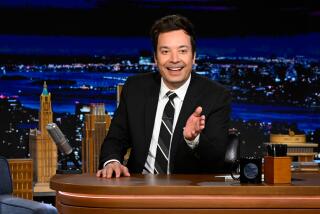There’s More to News Than a Household Name : Television: Connie Chung’s Saturday show demonstrates the growing status of newscasters.
Are the stars out tonight?
“PrimeTime Live” with Sam Donaldson and Diane Sawyer on ABC gets bigger headlines, but “Saturday Night With Connie Chung” on CBS is the new prime-time news series delivering the biggest performances.
Rarely have the values of news and entertainment been so artfully merged, and with such rewarding results. On a sour note, rarely has the importance that TV news attaches to its own stars been more dramatically on display as well. The past and future of TV news--the messenger and message system increasingly eclipsing the message--merge here too.
“Saturday Night With Connie Chung” is an enjoyable show, so you applaud--but uneasily.
Although near the bottom of the ratings, the successor to “West 57th” has largely been a program not to be missed, topped by last Saturday’s bewitching and profoundly moving segment on Terry Anderson, the longest held of the Western hostages in the Mideast. First came a capsule docudrama depicting the agonies of Anderson in captivity, followed by a Chung-moderated discussion with former hostages David P. Jacobsen and Father Lawrence M. Jenco; Anderson’s sister, Peggy Say, and former Assistant Secretary of State Richard Murphy.
The series premiered Sept. 23 in similar style--a panel discussion following a dramatic re-creation--with James Earl Jones giving a stirring performance as civil rights pioneer Vernon Johns of Montgomery, Ala. It was bracing television, as was much of Chung’s recent interview with Marlon Brando.
The Brando interview was fascinating in that it embodied at once the best and worst of this series.
His bluntness, combativeness, high standing as an actor, passion for social causes and media skepticism promised to make Brando a challenging and captivating interview subject. And he didn’t disappoint.
Everything went extremely well, with Chung asking some pointed questions and wisely giving Brando almost the entire stage. But then, inevitably--Chung’s name isn’t in the title for nothing--the interview dissolved into a joint performance. Chung’s cutaways seemed to grow longer and the camera shots of Brando and her together more frequent, until the two of them became an act, a duet, two celebrities in front of the cameras.
Barbara Walters could not have executed it more self-servingly. Well, perhaps just a shade more, for Chung didn’t sing or tap dance, and her modus operandi was the giggle, not the melodramatic pause and lowered gaze.
“Saturday Night With Connie Chung” also renews the debate over news division-produced programs potentially confusing viewers by stirring re-creations and reality in the same pot. There’s peril in giving substance and credibility to skillful re-enactments, as this program does, by making them the basis for ensuing discussions of the topics being depicted. And peril in using--as the program did in a riveting piece on the December’s crash of Pan Am Flight 103 over Lockerbie, Scotland--both actual home-movie footage of a victim and “reconstructions of the investigators’ own theories” on how the terrorists’ bomb may have been brought aboard.
Yet such programs as Chung’s and “PrimeTime Live” (which does not use re-enactments) reflect something far more intrinsic to TV news and something just as incongruous with its avowed mission to inform the public.
More than anything, the host of “Saturday Night With Connie Chung” is the epitome of the journalist as star, and stars tend to outshine everything in their presence.
Yes, you’re right. In a sense, this is old news: Edward R. Murrow was a star. Huntley and Brinkley were stars. Walter Cronkite was a star. “60 Minutes” was predicated on its correspondents becoming the stars of their stories. And so on and so on.
But times are changing. The number of news stars seems to be increasing even as the link between stardom and competence seems to be diminishing. TV news people, on both the network and local level, are increasingly promoted to us as personalities, and we are tuning in to them because of their personalities. No one should watch a newscast because of the messenger’s attractiveness, but--shame on us--that’s exactly what we do.
Chung’s exodus from NBC to CBS was widely regarded as a devastating loss for the former and an enormous coup for the latter because she was widely regarded as a valuable property and rising star. That was not because of anything she had accomplished journalistically, but because of some undefined star quality.
There are surely lesser interviewers and journalists on the air than Chung, who also anchors the Sunday evening news, has a nice personality and is very likable. But her name in the title? Please, give us a break. As it turns out, “Saturday Night With Connie Chung” works best without much Connie Chung. Attribute that to the good producers who do the work behind the scenes.
What makes a news star?
Chung is a journalism dean compared with Deborah Norville, who was on the list of NBC News “stars” cited last spring by division president Michael Gartner. It is Norville who recently replaced veteran correspondent and non-star John Palmer as news anchor on “Today” and is thought by many to be the heir apparent to Jane Pauley.
What makes Norville a news star? Her tough news coverage? Her reporting on Vietnam? Civil rights? AIDS? Central America? Glasnost? Get serious. This kid looks like Corky on “Murphy Brown.” Norville is a star because, well, she’s a star. That is why she is co-hosting the Macy’s Thanksgiving Day Parade on NBC with Willard Scott.
One of these days, as she continues to grow in stature, she’ll be joining the rest of the news stars in using television to share their views on the human condition, as if stardom and wisdom were necessarily synonymous. And America will listen because she’ll be a star.
By that time, Connie Chung’s present series will probably will have been canceled. But she’ll have a new one that will reflect her next level of stardom: “Connie Chung With Saturday Night.”
More to Read
The complete guide to home viewing
Get Screen Gab for everything about the TV shows and streaming movies everyone’s talking about.
You may occasionally receive promotional content from the Los Angeles Times.






